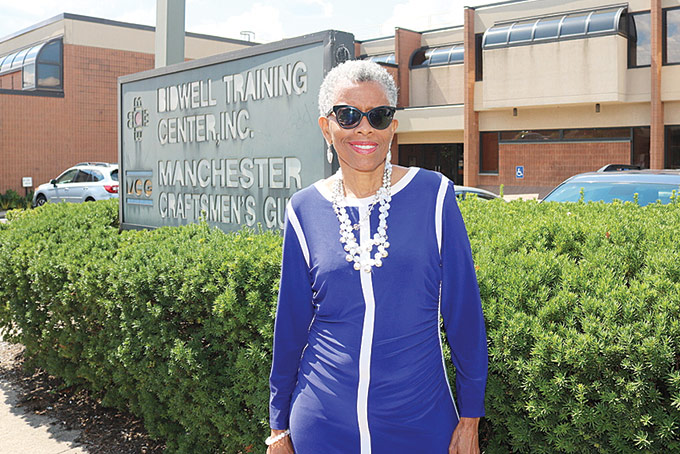
When Executive Director and Senior Vice President Valerie Njie began working at Bidwell Training Center in 1981, it was in the midst of reinventing itself—and not for the first, or last, time—and operated out of two long-gone warehouses across the street from the building it has shared with the Manchester Craftsmen’s Guild.
And it’s a good thing they had two buildings, she said, because one day a city building inspector came by and after a few minutes said everyone, and everything—machine tools, pipe, wiring, lumber—had to get out, permanently.
“We had to move everything out of there in two days. So, students, staff, everyone pulled together, and we did it,” she said. “That was an experience.”
Though there were other challenges along the way, none were that physically exhausting. But each one Njie overcame, and made Bidwell better. That was her goal for 37 years, and it will continue to be right up until she officially retires, Sept. 7.
Though she grew up in Homestead, her route to administering a nationally renowned career training facility was rather circuitous—by way of Massachusetts, Illinois, Utah, California and Gambia—where she married her husband; artist, dancer and photographer Saihou Njie.

In the wake of the 1968 assassination of Dr. Martin Luther King Jr., Rev. James “Jimmy Joe” Robinson founded Bidwell under the auspices of the banner of the federal government’s Manpower poverty program. In June of ’68, Njie was one of 50 African Americans who got full scholarships to the University of Pittsburgh, again via the federal government, under what was called “Project A.” Both of these federal initiatives were aimed at helping Blacks get out of poverty.
One of Njie’s classmates was the late Jesse Fife, who took over as director of Bidwell in the mid-1970s and later became COO of Manchester Bidwell Corp., the umbrella organization that includes Bidwell, MCG, MCG Jazz and the National Center for Arts and Technology.
“I was back here from Gambia on a visit with my daughter, doing some consulting, and heard about Bidwell—a year to the day later, Jesse hired me as senior counselor,” she said. “My first big job was the IBM program in 1985.”
As Bidwell evolved from a 1960s poverty program serving poor Blacks to one that then served anyone in Section 8 housing, with the collapse of the steel industry, it was at this time reinventing itself as a retraining program for displaced workers, and also women re-entering the workforce after raising families.
“IBM was setting up these computer training labs all over the country—but almost all of them were with the Urban League. So it was a real coup for us to get it,” she said.
The key to the IBM program’s success, and that of its other programs is that Bidwell takes its cues from industry—what do they need and what do they expect from their employees—so that Bidwell students can are trained to the highest industry standards and can be hired immediately and succeed. As a result, programs need to evolve, too.
“A lab is a lab is a lab,” she said. “You can be making solvents, or you could be making beer.”
Njie’s greatest challenge—and success—was seeking and attaining accreditation for Bidwell from the Accrediting Commission of Career Schools and Colleges. That allowed Bidwell to access federal Title IV funds, grant money that for-profit training schools cannot get. Fife also urged her to run for commissioner, which she did—and eventually won.
But the highlight for Njie came in 2012 when the commission named Bidwell an ACCSC School of Excellence. It won the five-year designation again in 2017, one of only 15 institutions across the country so recognized.
“We were a 1960s poverty Manpower program. There were thousands across the county—they’re all gone. But we’re still here, because we change lives,” she said.
“We are celebrating 50 years, and we’re bigger and better than ever. I’m going to miss it, but it’s not about Valerie—it’s about Bidwell. Our reward is the lives our graduates can live once they leave.”
Like us at https://www.facebook.com/pages/New-Pittsburgh-Courier/143866755628836?ref=hl
Follow @NewPghCourier on Twitter https://twitter.com/NewPghCourier